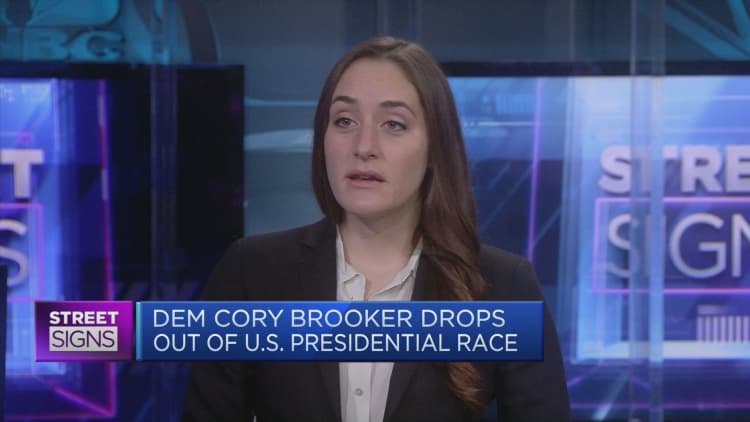If you're like many Americans, you're carrying a balance on your credit cards.
And the candidate you choose in November for president could have an effect on how well you grapple with those debts.
The latest numbers from the Federal Reserve show that credit card balances climbed to $930 billion in the fourth quarter of 2019 — a $46 billion increase from the previous quarter.
Average credit card debt per household is now $8,701, according to the latest estimates from personal finance website WalletHub.
An analysis by the Urban Institute found that individuals who live in southern states — particularly Mississippi — are more likely to be delinquent on their credit cards. Those who are behind on their balances also tend to be young, between the ages of 18 and 34, low income and lacking in financial knowledge, the Washington, D.C.-based think tank found.
As Sen. Bernie Sanders, I-Vt., has emerged as a Democratic front-runner in the 2020 presidential race, he has also set himself apart as the candidate who has made credit issues the biggest priority, according to Ted Rossman, industry analyst at CreditCards.com.
"He seems to have the most to say and the most specific things to say about credit," Rossman said.
That's after he teamed up with Rep. Alexandria Ocasio-Cortez, D-N.Y., last year to propose a bill that would put a 15% interest rate cap on credit cards, an idea he has also carried over to his presidential campaign platform.
"That bill hasn't gone anywhere in the current climate, but it definitely bears watching," Rossman said. "If Sanders is president, and if there is a Democratic Congress, then it would have a more realistic chance of passing."
More from Personal Finance:
Here are the winners and losers of the Trump tax cuts
Why Social Security is personal for presidential candidates
Democratic candidates take aim at small-business tax break
That would be a big change from today's rates. Individuals with good credit have an average interest rate of 17%, while those with poor credit face average rates of 25%. Meanwhile, more expensive store credit cards hover around 30% for all borrowers.
Sanders' platform calls for putting a stop to predatory debt collection practices. He also wants to replace existing credit reporting firms with a government public credit registry. That move is aimed at eliminating inherent economic and racial bias, according to Rossman.
"The con of this is that a lot of people say, 'What's to say the government is going to do it better than the free market?'" Rossman said. Critics also say taking over private credit reporting companies would put about 20,000 people out of work.

Sanders is not the only candidate who has touted policies to try to help borrowers, however.
Last year, Sen. Elizabeth Warren, D-Mass., teamed up with other Senate Democrats to propose a bill that would let states cap credit card interest rates for residents.
The risk with that proposal is that any time you leave something up to the states, rules will vary from state to state, said Matt Schulz, chief industry analyst at CompareCards.com.
"Both of these proposals are dead in the water unless things change significantly after the November election," Schulz said.
Biden is a wild card
One candidate on the opposite end of the spectrum, according to Rossman, is former vice president Joe Biden.
"Biden has really been accused by a lot of Democrats of being in cahoots with the financial industry," Rossman said. "This goes back to his time as a senator from Delaware, because so many credit card companies are based in Delaware."
A lot of banks are drawn to the state because it has loose usury laws, which dictate the amount of interest that can be charged on loans.
Biden and Warren previously clashed over a 2005 bankruptcy bill that made it more difficult for individuals to get out of debt by filing for bankruptcy. Biden voted yes to the bill, which was passed.
Warren, who was a Harvard law professor at the time, spoke out against the initiative. In an essay published earlier this year, Warren wrote that the bill's passage caused bankruptcy filings to permanently fall by 50% and the number of insolvent people to rise by 25%.
Other candidates to watch
Pete Buttigieg, who served as mayor of South Bend, Indiana, is known to have grappled with credit card balances himself, Rossman said. Buttigieg and his husband still reportedly have six-figure student loan debt.
"He empathizes with the plight of people in their 20s and 30s who have student debt and credit card debt," Rossman said.
Buttigieg's policy calls for putting an end to mandatory arbitrations, where disputes are often resolved in favor of credit card companies.
Former New York City Mayor Mike Bloomberg's plan calls for curbing high overdraft fees and aggressive debt collection practices. He also wants to make credit reporting firms more responsible for Americans' personal financial data.
Sen. Amy Klobuchar, D-Minn., co-sponsored a bipartisan bill last year that would make it easier to fix errors on credit reports.
Tom Steyer, a billionaire businessman, has not issued a formal proposal but has spoken out against egregious lending practices, particularly those targeting college students.
"As president, Tom will strengthen protections against predatory practices targeting college students and direct the Consumer Finance Protection Bureau to aggressively enforce these protections," Steyer's press secretary, Patrice Snow, said in a statement.


